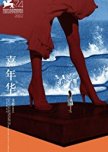Esta resenha pode conter spoilers
Writer/Director Vivian Qu delivers a caustic commentary of the treatment of women and young girls in China. Shown primarily from a female perspective she lays bare the inequality of the sexes by a society still focused on a girl's virginity as a primary virtue. And also casts a dark lens on the men who exploit that limited virtue for themselves.
Two twelve-year-old girls are lured to a hotel by a powerful middle-aged man and raped. Mia, a young runaway working at the motel sees him break into the girls' room. Director Qu takes a risk in not having one protagonist, but two. One of the twelve-year-olds, Wen, was already suffering at school as a child of divorced parents. Qu largely focused on her experience as well as Mia's quandary of not wanting to help for fear of losing her job. Mia comes across as self-serving and hyper focused on her own survival, always one step away from homelessness. Wen must not only deal with her own experience but also her mother's response and the adults who should be protecting her but don't. The only two people seeking justice are Wen's father and her lawyer.
Warning! What follows may have spoilers...
The performances are spare but powerful. There are no histrionics, no sobbing uncontrollably and screaming. The girls and the lawyer know they are fighting a battle that will likely not be won, but keep moving forward, keep enduring, keep fighting.
Set against the backdrop of an ocean vacation town, with a giant statue of Marilyn Monroe, the seedy happenings were not done in the dark corners but in plain sight making it even more disturbing. It feels like Qu was able to shine a light without the censors cracking down because she might have been alluding to the Western influences of the objectification of women in the statue and possibly in all of the brides dressed in Western wedding gowns having their pictures taken on the beach as a source of the problems. But Western influences did not cause a powerful middle-aged man to rape two children. Or cause the corrupted police force and medical community to cover it up. Or cause a mother to blame her daughter for what happened. Or cause other parents to profit off of their daughter. Or leave a runaway without a safety net. Or cause an older girl to risk her health, fertility, and life to have a fake hymen implanted. Or cause a teacher to treat Wen as less than because her parents were divorced. These are societal failures for women and girls and Qu did not shy away from showing the toll they take.
Angels Wear White is a difficult movie to watch with no easy answers. It may cause despair and anger on the part of the viewer. But perhaps in giving an unflinching and unsentimental view it knocks down one more brick in the wall separating women and children (regardless of gender) from justice, justice lacking not just in China, but worldwide.
Two twelve-year-old girls are lured to a hotel by a powerful middle-aged man and raped. Mia, a young runaway working at the motel sees him break into the girls' room. Director Qu takes a risk in not having one protagonist, but two. One of the twelve-year-olds, Wen, was already suffering at school as a child of divorced parents. Qu largely focused on her experience as well as Mia's quandary of not wanting to help for fear of losing her job. Mia comes across as self-serving and hyper focused on her own survival, always one step away from homelessness. Wen must not only deal with her own experience but also her mother's response and the adults who should be protecting her but don't. The only two people seeking justice are Wen's father and her lawyer.
Warning! What follows may have spoilers...
The performances are spare but powerful. There are no histrionics, no sobbing uncontrollably and screaming. The girls and the lawyer know they are fighting a battle that will likely not be won, but keep moving forward, keep enduring, keep fighting.
Set against the backdrop of an ocean vacation town, with a giant statue of Marilyn Monroe, the seedy happenings were not done in the dark corners but in plain sight making it even more disturbing. It feels like Qu was able to shine a light without the censors cracking down because she might have been alluding to the Western influences of the objectification of women in the statue and possibly in all of the brides dressed in Western wedding gowns having their pictures taken on the beach as a source of the problems. But Western influences did not cause a powerful middle-aged man to rape two children. Or cause the corrupted police force and medical community to cover it up. Or cause a mother to blame her daughter for what happened. Or cause other parents to profit off of their daughter. Or leave a runaway without a safety net. Or cause an older girl to risk her health, fertility, and life to have a fake hymen implanted. Or cause a teacher to treat Wen as less than because her parents were divorced. These are societal failures for women and girls and Qu did not shy away from showing the toll they take.
Angels Wear White is a difficult movie to watch with no easy answers. It may cause despair and anger on the part of the viewer. But perhaps in giving an unflinching and unsentimental view it knocks down one more brick in the wall separating women and children (regardless of gender) from justice, justice lacking not just in China, but worldwide.
Esta resenha foi útil para você?

 55
55 223
223 11
11























